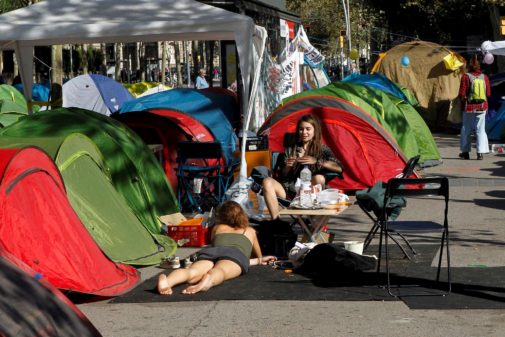- Surveys: This is how the polls of the 10-N general elections have remained
- Protest: The Electoral Board allows the separatist camp in the center of Barcelona to remain on 10-N
Not only from the Criminal Code are the prisons. One of the laws that also provides for prison sentences is the one that specifically regulates electoral processes. For a few weeks, judges, prosecutors and Security Forces of Catalonia review the Organic Law of the General Electoral System (Loreg) before possible actions of the Defense Committees of the Republic (CDR), platforms such as Tsunami Democràtic or the most radical block of the CUP coinciding with the 10-N.
Although the radical independence formation is presented for the first time to the national elections, from the minority sector that opposed that participation it has been called to "boycott the elections to subtract the maximum legitimacy from the new Congress". In response, messages have been repeated on social networks such as Let's Resent the Enemy's Elections. Unionists who want to vote will see that there is much queue to do so .
In the face of such threats, Chapter VIII of the Electoral Law was drafted, dedicated to "electoral crimes and infractions." It contains 18 articles, but there are two that could end up being applied in extreme situations. One of them contemplates sentences of one to three years in prison to "those who with violence or intimidation put pressure on the voters so that they do not use their right". If the action is not especially serious, the rule allows the matter to be resolved with a fine.
The same article 146 of the Loreg envisages imposing those same sentences on those who "unreasonably impede or impede the entry, exit or permanence of the electors, candidates, proxies, auditors and notaries in the places where acts of the electoral procedure are carried out." This assumption is what Citizens anticipated when he asked the Electoral Board of Barcelona to prevent the camping of the University Square, which in his opinion put the vote at the polling station located there. The Board rejected it, but it did indicate that it was necessary that on the day of the vote "the step towards the electoral college be found free and expedited," without "political symbols or claims."
The following article (147) punishes actions less serious than the previous ones of altering the order of the electoral act. It provides for the imposition of fines or even one year in prison to those who "seriously disturb the order in any electoral act" or penetrate the premises where the elections are held "carrying weapons or other instruments likely to be used as such."
As for the Criminal Code , some action that prevented the exercise of the vote could fit into a crime of coercion that could carry higher penalties than those contemplated in the Loreg. Violent incidents could be treated as the events that have taken place in the protests of recent weeks against the sentence of the process : as crimes of public disorders, attack on the authority or, where appropriate, injuries. Given the coincidence of two possible rules to be applied, the Prosecutor's Office and the judges would have to decide whether they use the one that includes the toughest penalties (Penal Code) or the most specialized (Loreg).
If the dimensions of the electoral blockade were relevant and violent, on the paper a new cause could be contemplated by rebellion. The article that regulates this crime punishes the public and violent uprising not only to repeal the Constitution, as was raised in the trial of the process , but also to "prevent the free holding of elections for public office."
The Government has shown its concern about possible incidents on election day. After the first threatening messages from radical independentist environments, the acting Minister of Justice, Dolores Delgado , warned that the police would act to prevent the commission of "electoral crimes."
According to the criteria of The Trust Project
Know more- CDR
- Cup
- Citizens
- Dolores Delgado
CataloniaQuim Torra guarantees that the Parliament will address "without limits" self-determination
Politics The Assembly of Madrid asks to outlaw the "separatist parties" that attempt against the "unity" of Spain
PoliticsJxCat and ERC participate in protests against the King

